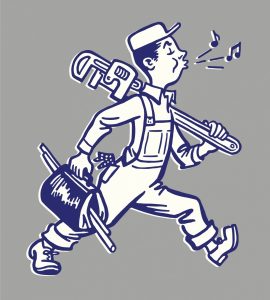You’re brushing your teeth, doing the dishes, or just relaxing when suddenly—disaster strikes. Water starts gushing from a pipe, a toilet overflows, or your ceiling starts leaking. Panic sets in. What do you do now?
Plumbing emergencies can be chaotic, but staying calm and taking quick, smart action can save your home from serious damage. Here’s how to know when you truly need an emergency plumber in New Jersey—and what you should do right away.
Signs You Need an Emergency Plumber
Not all plumbing issues require a 3 a.m. phone call, but some situations definitely do. Call for emergency plumbing help immediately if you experience any of the following:
- Burst pipes – These can flood your home quickly, especially in winter.
- Major leaks – If water is pooling or spraying uncontrollably, it’s time to act fast.
- Overflowing toilets or drains – Especially if it’s not just water, but sewage (gross and dangerous).
- No water – A complete loss of water could be due to a broken main or serious system failure.
- Water heater failure – Leaking or dangerous temperature fluctuations can pose health risks.
- Sewer line backup – If multiple drains are clogging at once and foul odors are present, it could be a sewer issue.
If you’re unsure, trust your instincts—if it feels urgent, it probably is.
First Steps to Take in a Plumbing Emergency
Before the plumber arrives, your priority is to minimize water damage. Here’s what you can do immediately:
1. Locate and Shut Off the Water
If you see water pouring out of a pipe or fixture, shut off the water immediately.
- For toilets, look behind the unit for the shut-off valve and turn it clockwise.
- For sinks, check under the cabinet—there should be a hot and cold valve.
- For washing machines, the valves are usually behind the appliance.
- If you’re unsure where the water is coming from—or if it’s widespread—shut off the main water supply to your home. This valve is typically located in a basement, crawl space, utility room, or outside near your water meter. Turn it clockwise until it stops.
2. Turn Off the Water Heater
If there’s a major leak or you’ve shut off the main supply, turn off your water heater to prevent damage or overheating. For gas water heaters, turn the dial to “pilot.” For electric, switch off the breaker.
3. Contain the Damage
Use towels, buckets, or a wet/dry vacuum to soak up standing water. Move furniture and valuables out of harm’s way. If a ceiling is bulging, place a bucket underneath and gently poke a small hole to relieve pressure—it may prevent a bigger collapse.
4. Call an Emergency Plumber
Once things are under control, call us, your licensed emergency plumber. Give us a clear picture of what’s happening and what steps you’ve already taken.
Don’t Wait—Be Prepared
Plumbing emergencies can be scary, but with a little preparation and a calm head, you can take charge of the situation. Familiarize yourself with your home’s plumbing shut-off points before you need them. Keep our number handy, and don’t hesitate to call when water starts flowing where it shouldn’t.
Contact MarGo Plumbing Heating Cooling Inc. today to schedule an appointment or ask any questions about heating and plumbing services in Cedar Grove, NJ!

